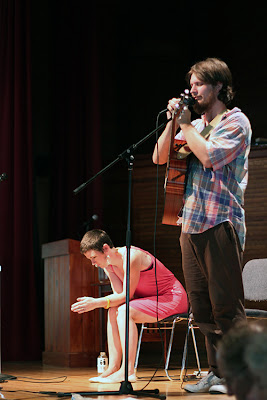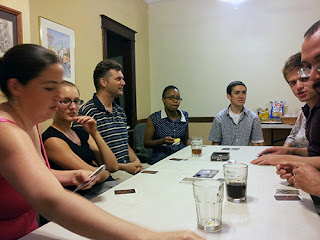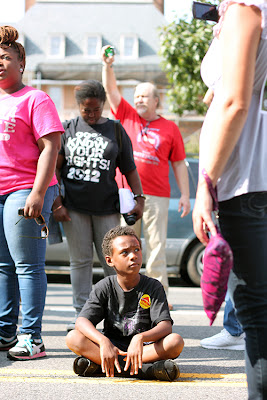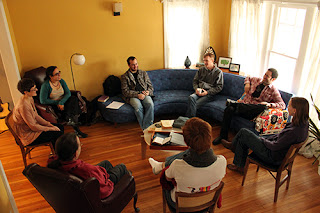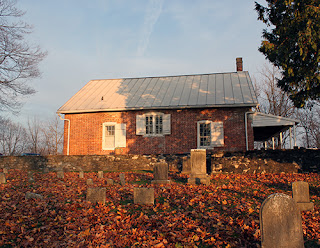Quaker musician and minister Jon Wattspublished another provocative blog post on Friday, entitled Support A Minister. Sell Your Meetinghouse. In his characteristically passionate style, Jon is calling on the Quaker community to step up to the plate and support the ministry that God is raising up in our midst. He insists that genuine, Spirit-led ministry requires real commitment, not just on the part of the minister, but also from the wider community.
For many Quakers, the idea that we should financially support ministry is a radical concept. The truth is, we often struggle with providing even basic counsel and spiritual care for our budding young ministers. Rising generations have a deep need for mentoring, love and guidance – a need that often goes unmet for a variety of reasons.
In some cases, our communities may not have the spiritual depth to provide this kind of care. Other times, we might shy away from providing explicit guidance for the lives of others, fearing the appearance of hierarchy or rigid dogma. So often, our capacity to guide and care for the emerging gifts in our midst is simply overwhelmed by the demands of everyday life. The spirit is willing, but the flesh is weak.

If providing basic spiritual care and oversight for ministry is often challenging for us, providing financial support can be even harder. We are caught in the economic stranglehold of the Great Recession, and most of us are looking for ways to reduce costs and hold on to the little bit we have left. Even in more prosperous times, financial support for ministry could be a hard sell. Now is a particularly unfavorable moment to make a pitch for financially released ministry.
Yet the crisis facing the Quaker community today is not primarily financial. As a group, North American Quakers have all the money we need. Scarcity – at least for the time being – is not the issue. The real question facing us has to do with what it means to be a community in the 21st century.
For Quakers, the definition of community has been unraveling for at least 150 years. At one time, Friends lived under a tight code of community discipline, similar in many ways to the modern-day practices of the Amish or Conservative Mennonites. Being a member of a Quaker Meeting meant submitting to a strict code of dress, behavior and speech. It also meant participation in an intense form of solidarity with the other members of the community. If the Meeting determined that a minister had been led by God to travel in the service of the gospel, Friends would financially support that minister and her family for the duration of her travels. Ministerial trips frequently lasted for months – even years.
Our way of life has changed dramatically in the last century and a half. At this point, “community” is a vague term that can mean almost anything, and even the most traditionalist Friends come nowhere close to the level of shared commitment, discipline and solidarity that once characterized our Meetings. Indeed, the basis of our congregations has become so weakened that in many places the very idea of formal membership is being challenged. What is the point of formally joining a Quaker Meeting?
This is a legitimate question. In most cases, our communities are a pale reflection of the robust network of relationships, mutual support and obligations that once characterized our fellowships. When formal membership no longer represents significant commitment, it is quite reasonable to ask: What is the point?
I think that we as Friends would do well to sit with this question, without seeking to answer it too quickly, because it strikes to the heart of our shared crisis today. Clearly, the structures of historic Quakerism do not work the way they once did. The Monthly, Quarterly and Yearly Meeting no longer have the same power to draw us in and command our attention. Why is this?
Jon Watts writes about the ministry of prophetic music, saying, “I want to say that I don’t see it as myministry. It is yours. You tell me what to do with it.” Who is Jon talking to? Who is the community that Jon is seeking to be accountable to? As best I can tell, Jon is speaking to “all Friends everywhere.” In his desire to be faithful, answerable and supported, Jon has reached out to everyone.
But “everyone” is not a community, in concrete terms. In the Quaker tradition, members of communities make concrete commitments to one another, and stick to them even when it is uncomfortable; even when there is fierce disagreement. Members of Christian communities love one another, not merely because of momentary passion, but because we sense that God has knit us together into a whole that is greater than the sum of its parts. We become a body. The body of Christ.
We all long for this. Our hearts ache for this true community – the fellowship we find when we are drawn together into something bigger than ourselves. This experience of unity, love and shared purpose in the Spirit is the basis for all support, shared discernment and accountability. It is the foundation upon which sustainable ministry is built.
Do our centuries-old systems of Monthly, Quarterly and Yearly Meetings still serve as useful containers for this experience? Is formal membership, as it functions in many of our local congregations today, an aid or a hindrance to the uniting power of the Holy Spirit? Do the ways that we gather together amplify the voice of Christ within, or do our inherited forms threaten to block the continuing revelation of Jesus?
Jon Watts suggests that we should sell our meetinghouses and use the proceeds to support Spirit-led ministry. That is an exciting idea. But we may need to go even further. What would it look like to re-imagine our formal structures as Friends? What would a 21st-century understanding of membership look like? Of gospel ministry and eldership? Of mutual support and accountability under the direct leadership of Christ?
What if selling the meetinghouse is just the beginning?
 If providing basic spiritual care and oversight for ministry is often challenging for us, providing financial support can be even harder. We are caught in the economic stranglehold of the Great Recession, and most of us are looking for ways to reduce costs and hold on to the little bit we have left. Even in more prosperous times, financial support for ministry could be a hard sell. Now is a particularly unfavorable moment to make a pitch for financially released ministry.
If providing basic spiritual care and oversight for ministry is often challenging for us, providing financial support can be even harder. We are caught in the economic stranglehold of the Great Recession, and most of us are looking for ways to reduce costs and hold on to the little bit we have left. Even in more prosperous times, financial support for ministry could be a hard sell. Now is a particularly unfavorable moment to make a pitch for financially released ministry.